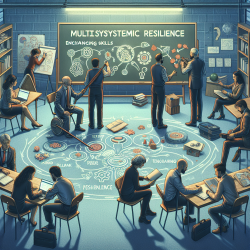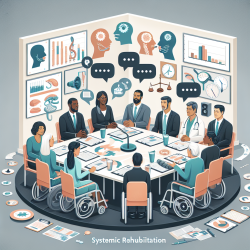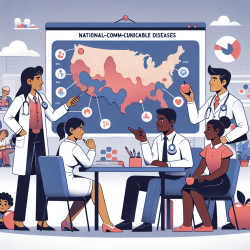The R2 Resilience Program© offers a novel approach to building resilience by focusing on both individual ruggedness and enhancing access to resources. This dual focus is crucial for practitioners aiming to improve their skills and effectively support individuals facing adversity. By understanding and implementing the principles of the R2 program, practitioners can foster resilience in diverse populations.
The Multisystemic Approach
The R2 Resilience Program© is grounded in a multisystemic perspective, which emphasizes the interplay between individual qualities (ruggedness) and external resources. This approach challenges traditional resilience programs that focus solely on individual change. Instead, it advocates for interventions that address both personal and environmental factors.
This perspective is supported by research indicating that resilience is not just an individual trait but a dynamic process involving interaction with one's environment. For example, studies have shown that self-efficacy can mediate the impact of socioeconomic constraints on mental health, while family cohesion can buffer the negative effects of parental problem drinking.
Implementing the R2 Program
The R2 Resilience Program© is designed to be adaptable across various contexts and populations. It involves four key phases:
- Contextualization: Identifying relevant resilience factors for each setting through a Delphi process.
- Offsite Program Development: Creating tailored modules based on identified factors.
- Implementation: Introducing the program to participants and training facilitators.
- Evaluation: Assessing outcomes to refine and improve the program.
This structured approach ensures that the program is contextually relevant and effective in enhancing both individual ruggedness and resourcefulness.
The Benefits for Practitioners
For practitioners, implementing the R2 Resilience Program© offers several benefits:
- Diverse Applications: The program's flexibility allows it to be used in various settings, from schools to corporate environments.
- Evidenced-Based Strategies: The program draws on a strong evidence base, ensuring that interventions are effective and scientifically sound.
- Sustainable Impact: By addressing both individual and systemic factors, the program promotes long-term resilience rather than short-term fixes.
The R2 program also encourages practitioners to engage in meaningful conversations about resilience, providing practical strategies for improving both personal qualities and access to resources.
A Call for Further Research
The preliminary findings of the R2 program suggest its effectiveness in various contexts. However, ongoing evaluation is essential to refine its implementation further. Practitioners are encouraged to contribute to this growing body of research by exploring how these principles can be applied in their specific areas of work.
The R2 Resilience Program© represents a significant advancement in resilience training. By adopting its multisystemic approach, practitioners can enhance their skills and better support individuals facing adversity. To delve deeper into this innovative program, consider reading the original research paper: Becoming More Rugged and Better Resourced: The R2 Resilience Program’s© Psychosocial Approach to Thriving.










